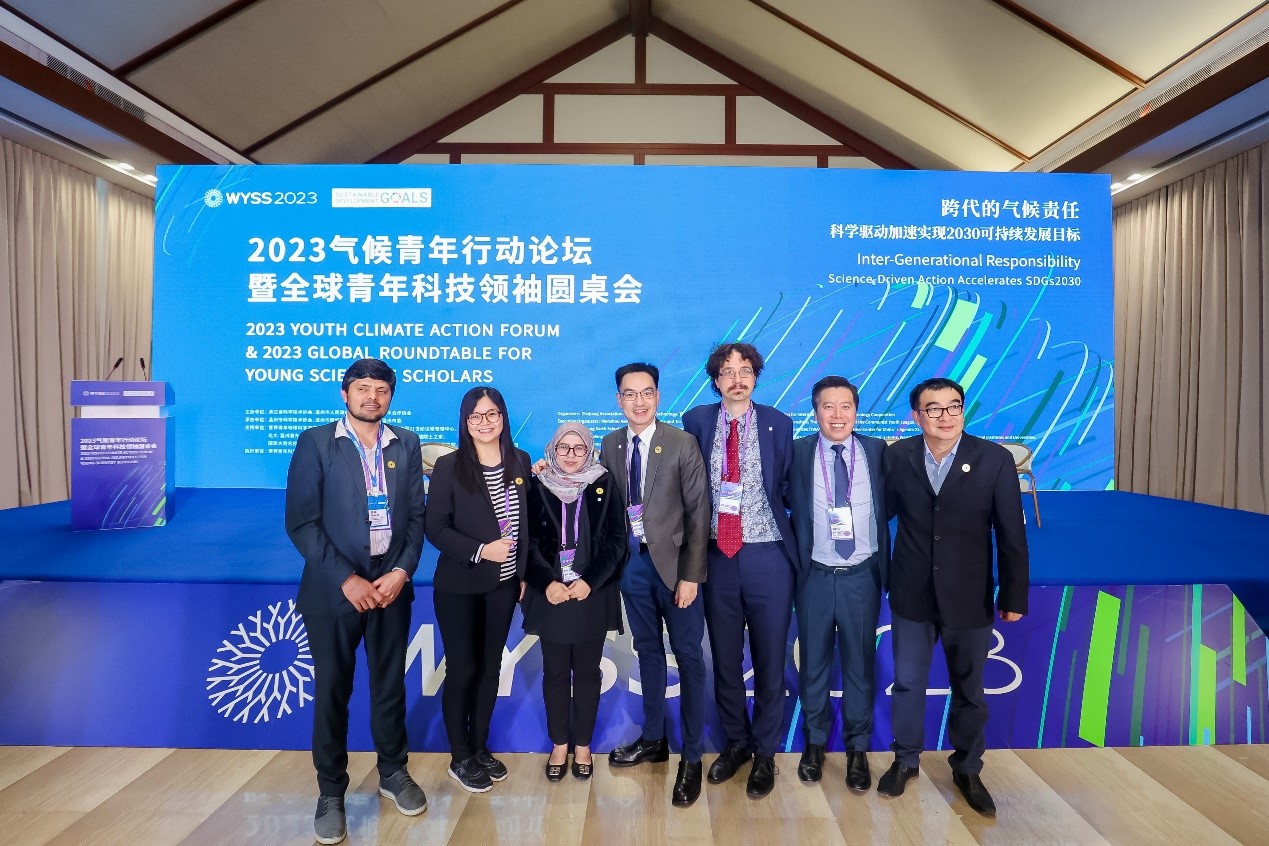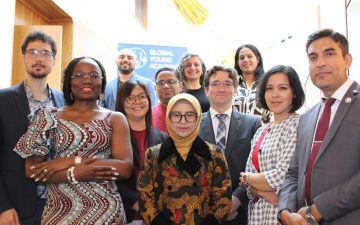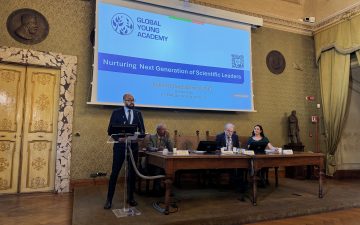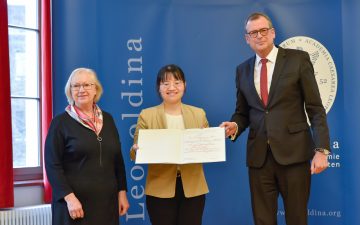As part of the 2023 World Young Scientist Summit (WYSS), the core events “2023 Climate Youth Action Forum” and “2023 Global Roundtable for Young Scientist Scholars” took place on 11-12 November 2023, in Wenzhou, Zhejiang, China, moderated by Global Young Academy (GYA) member Meng Wang (Chinese Academy of Sciences), who is also the WYSS Executive Secretary General.
Further members from the GYA in attendance included Muhammad Qasim (Cytotech, New Zealand), Siok Yee Chan (Universiti Sains Malaysia), GYA Executive Committee member Sri Fatmawati (Institut Teknologi Sepuluh Nopember, Indonesia), Udom Sae-Ueng (National Center for Genetic Engineering and Technology of the National Science and Technology Development Agency, Thailand), Francesco Maurelli (Constructor University Bremen, Germany), along with GYA founding member and alumnus Wibool Piyawattanametha (King Mongkut’s Institute of Technology Ladkrabang, Thailand).
The WYSS gathered more than 800 global experts, scholars, and young talents from the fields of green technology, low-carbon initiatives, climate change, and sustainable development gathered to explore new opportunities for collaborative efforts across regions, disciplines, and generations to actively address climate challenges and offer strategies for a green and sustainable future, especially there are only less than two weeks left to COP28, to show the clear perspective and position from all young scientists.
Global Warming Control Within 1.5°C – What Can the World Do?
“Many people are familiar with speed limit signs, but few know the meaning of 350PP, which refers to the safe level of carbon dioxide concentration per million. This concept was introduced a decade ago,” remarked Max Paoli, the Project Director of the World Academy of Sciences, during the event. During the COP21 conference in 2015, countries worldwide reached a unanimous commitment to make maximum efforts to limit global warming to within 1.5°C by 2050. The question “What can we do in the face of global climate change?” has become the “soul-searching question” for scientists from various countries present at the event.
With only 7 years left for SDGs2030 as the most significant global challenge this generation has ever faced, with the inter-generational and cross-geographical responsibility, GYA members strongly called for a return to the Sustainable Development Goals, the restoration of global trust and peace and the necessary science-driven actions.
Action in Developing Countries
Currently, global climate change is exacerbating disasters such as droughts, wildfires, and floods. The lack of funds remains the major obstacle hindering developing countries from taking corresponding action. According to the latest “2023 Adaptation Gap Report” released by the United Nations Environment Programme, the funds raised by developed countries are far from sufficient to help developing countries adapt to climate change, estimated to be only one-tenth to one-eighteenth of the required adaptation funds for developing countries.
Many scientists present at the event are from developing countries. Recognizing the disparities in research resources and infrastructure between themselves and developed countries, it is a common consensus among many scientists to develop solutions suitable for their countries.
During the panel session, GYA members dialogued with the ministers and presented their concerns as scientists. “When we talk about climate change, how to use more publicity and education to make the next generation aware of its importance, how to instill the right concepts in remote and impoverished areas, and how to protect the earth daily. These are all issues worthy of our focused consideration,” expressed EC member Sri Fatmawati. In developing countries, we hope to have solutions suitable for local communities, requiring scientists to understand each society’s specific situations to better disseminate scientific knowledge to local communities.
Tailored solutions can range from macro-level national sustainable development goals to micro-level issues such as using agricultural products in planting. For instance, Udom Sae-Ueng focuses on interdisciplinary research in biology and physics, conducting relevant research in the agricultural field to reduce pesticide and agrochemical usage while cultivating durian, a famous fruit in Thailand.
Strategies Across Various Sectors
From another perspective, addressing the challenges of global climate change is not only a matter that requires consideration among countries but also permeates across various sectors.
Jia Limin, Chief of the National Key Laboratory of Rail Traffic Control and Safety at North China Electric Power University and Executive Dean of the Institute of Energy and Transportation Integration Development, introduced the concept of “self-sufficient energy for transportation.”
“In China, the daily electricity consumption of the high-speed rail system is 230 million kilowatt-hours, with an annual cumulative electricity consumption of 83.95 billion kilowatt-hours; under normal circumstances, the solar energy resources embedded in the land space of China’s high-speed rail system can produce approximately 170 billion kilowatt-hours of electricity,” Prof. Jia Limin explained, clearly demonstrating the enormous potential of the self-sufficient energy of the railway system in China.
Addressing global climate change solutions can extend beneath the seas. “More autonomous and intelligent marine robot technology is a major focus of research in the marine field, and strengthening marine environmental monitoring can allow us to gain a deeper understanding of the closely linked climate change,” indicated Francesco Maurelli.
Solutions to address global climate change issues can also lie beneath the Earth’s surface: “Currently, few young people are willing to choose earth science majors, possibly because industries such as oil and gas extraction and mining may not seem environmentally friendly, weakening their appeal to young people. We should try to stimulate young people’s interest in earth sciences as much as possible, establish a global network, actively build a cooperative system, and bring more fresh blood to this industry, which is equally closely related to the future of the Earth.”
Addressing global climate change affects every aspect of life. Diversified collaborative innovation with a global perspective is the trend. Jin Xiaoming, Director of the Science and Technology Diplomatic Expert Committee of the China Association for Science and Technology Diplomacy, said that non-governmental science and technology diplomacy can accelerate global climate action through international cooperation, share innovative results through open and inclusive scientific and technological exchanges and collaboration, and genuinely benefit all countries and peoples from technological dividends.
Global pi (π) Community, New Partnership Initiative on accelerating SDGs action
To accelerate the UN SDGs 2030, WYSS will support a new initiative as the global innovation network named PI (π) Community to support innovation cooperation from regional to global.
In 2021, 50 young science and technology leaders from more than 40 countries, including the United Kingdom, Canada, South Africa, Argentina, and Japan, gathered in the Global Roundtable of Young Science and Technology Leaders with scientists, entrepreneurs, and venture capitalists to “cloud” to discuss the construction of a global youth science and technology innovation community. The WYSS π community was firstly proposed and officially launched and operated in 2022. PI implies “infinite possibility, infinite power, infinite hope” at the core of the spirit. The PI community cares about the earth, human beings, and our future. It pays close attention to the development of science and technology, life health, biosafety, climate change, clean energy, future technology, etc.
In the last two years, the PI community developed “friends” with higher institutes, international groups, financial institutions, governments, international organizations, etc., to build a global network with youth “wisdom” and “youth power.” The PI community integrates international science and technology international science and technology resources, academics, and other cooperation organization resources to carry out international exchange and youth innovation in science and technology cooperation.
In the future, we plan to set up 20 PI communities or hubs globally as the region’s innovation incubator and accelerator and connect as the youth innovation cooperation network from around the world to encourage innovation and accelerate the Sustainable Development Goals 2030.




